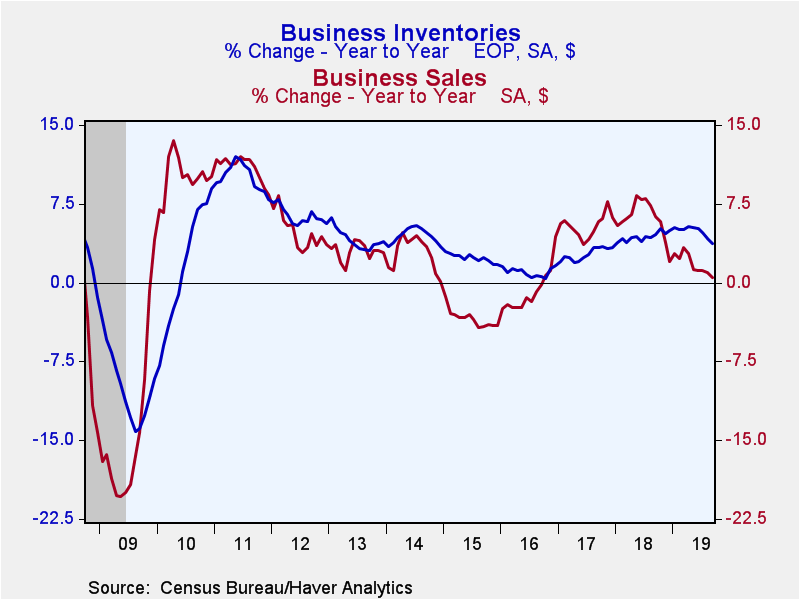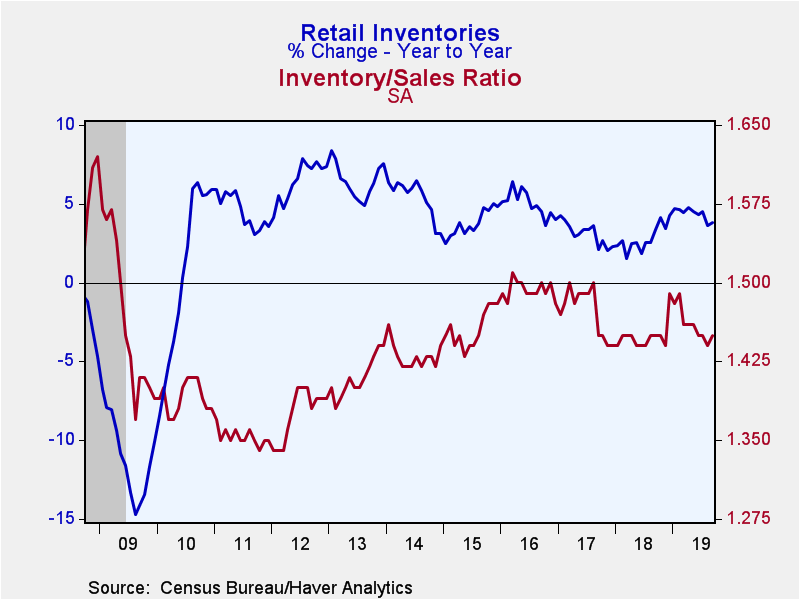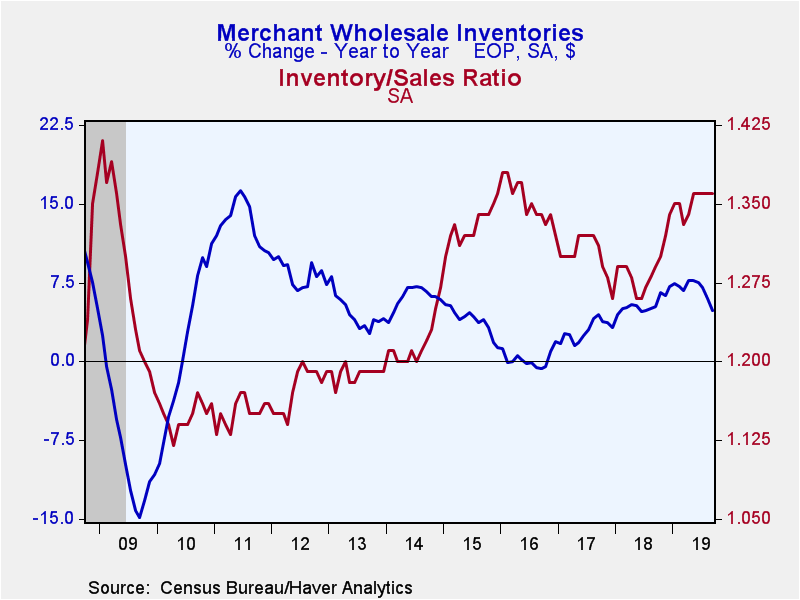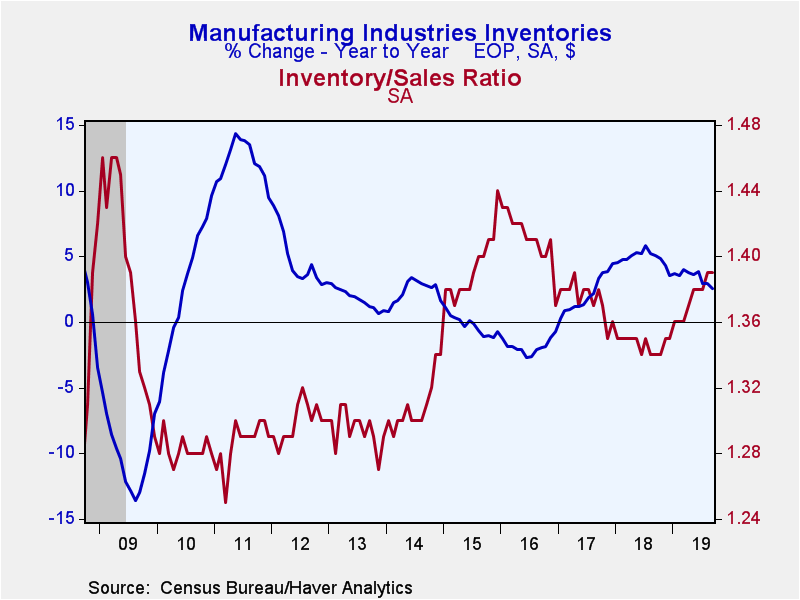 Global| Nov 15 2019
Global| Nov 15 2019U.S. Business Inventories Remain Unchanged While Sales Ease
by:Tom Moeller
|in:Economy in Brief
Summary
Total business inventories held steady during September (3.7% y/y) following a 0.1% August dip, revised from 0.0%. Total business sales weakened 0.2% (+0.5% y/y) after a 0.1% uptick, revised from 0.2%. The inventory-to-sales (I/S) [...]
Total business inventories held steady during September (3.7% y/y) following a 0.1% August dip, revised from 0.0%. Total business sales weakened 0.2% (+0.5% y/y) after a 0.1% uptick, revised from 0.2%. The inventory-to-sales (I/S) ratio held steady at 1.40 for the fifth straight month.
Retail inventories rose 0.2% (3.8% y/y) in September and reversed the August decline. Auto inventories rose 0.2% (5.3% y/y) while nonauto inventories gained 0.2% (3.0% y/y). Inventories of furniture & home furnishings declined 0.5% (-2.2% y/y), down for the sixth month in the last seven. Clothing inventories eased slightly (+1.1% y/y) after a 0.2% decline. General merchandise store inventories rebounded 0.7% (0.6% y/y) after a 0.3% drop while department store inventories gained 0.4% (-7.2% y/y), rising for only the second month this year. Wholesale inventories declined 0.4% (+4.8% y/y) in September after rising slightly for two months. Factory sector inventories increased 0.3% (2.6% y/y) after little change over three months.
Retail sales declined 0.5% (+3.8% y/y) in September after a 0.6% rise. Sales excluding autos declined 0.2% (3.4% y/y). Wholesale sector sales were unchanged (-0.6% y/y) after easing 0.1%, while shipments from the factory sector fell 0.2% (-1.2% y/y).
The inventory-to-sales ratio in the retail sector rose slightly to 1.45, but has been falling since early this year. The non-auto retail I/S ratio also rose slightly, but nearly matched its all-time low. The wholesale I/S ratio was unchanged at 1.36 in September while the manufacturing I/S ratio held at 1.39.
The manufacturing and trade data are in Haver's USECON database.
| Manufacturing & Trade | Sep | Aug | July | Sep Y/Y | 2018 | 2017 | 2016 |
|---|---|---|---|---|---|---|---|
| Business Inventories (% chg) | 0.0 | -0.1 | 0.3 | 3.7 | 4.9 | 3.4 | 1.7 |
| Retail | 0.2 | -0.2 | 0.7 | 3.8 | 4.2 | 2.4 | 4.0 |
| Retail excl. Motor Vehicles | 0.2 | -0.2 | 0.3 | 3.0 | 1.7 | 2.0 | 2.0 |
| Merchant Wholesalers | -0.4 | 0.1 | 0.2 | 4.8 | 7.1 | 3.3 | 1.9 |
| Manufacturing | 0.3 | -0.1 | 0.1 | 2.6 | 3.5 | 4.5 | -0.7 |
| Business Sales (% chg) | |||||||
| Total | -0.2 | 0.1 | 0.2 | 0.5 | 6.1 | 5.4 | -0.8 |
| Retail | -0.5 | 0.6 | 0.8 | 3.8 | 4.6 | 4.5 | 2.4 |
| Retail excl. Motor Vehicles | -0.2 | 0.2 | 0.9 | 3.4 | 5.3 | 4.8 | 1.9 |
| Merchant Wholesalers | 0.0 | -0.1 | 0.2 | -0.6 | 6.5 | 6.7 | -1.3 |
| Manufacturing | -0.2 | -0.3 | -0.3 | -1.2 | 6.9 | 5.0 | -3.2 |
| I/S Ratio | |||||||
| Total | 1.40 | 1.40 | 1.40 | 1.36 | 1.36 | 1.38 | 1.42 |
| Retail | 1.45 | 1.44 | 1.45 | 1.45 | 1.45 | 1.47 | 1.49 |
| Retail excl. Motor Vehicles | 1.19 | 1.18 | 1.18 | 1.19 | 1.20 | 1.24 | 1.28 |
| Merchant Wholesalers | 1.36 | 1.36 | 1.36 | 1.29 | 1.29 | 1.30 | 1.35 |
| Manufacturing | 1.39 | 1.39 | 1.38 | 1.34 | 1.35 | 1.37 | 1.41 |
Tom Moeller
AuthorMore in Author Profile »Prior to joining Haver Analytics in 2000, Mr. Moeller worked as the Economist at Chancellor Capital Management from 1985 to 1999. There, he developed comprehensive economic forecasts and interpreted economic data for equity and fixed income portfolio managers. Also at Chancellor, Mr. Moeller worked as an equity analyst and was responsible for researching and rating companies in the economically sensitive automobile and housing industries for investment in Chancellor’s equity portfolio. Prior to joining Chancellor, Mr. Moeller was an Economist at Citibank from 1979 to 1984. He also analyzed pricing behavior in the metals industry for the Council on Wage and Price Stability in Washington, D.C. In 1999, Mr. Moeller received the award for most accurate forecast from the Forecasters' Club of New York. From 1990 to 1992 he was President of the New York Association for Business Economists. Mr. Moeller earned an M.B.A. in Finance from Fordham University, where he graduated in 1987. He holds a Bachelor of Arts in Economics from George Washington University.
More Economy in Brief
 Global| Feb 05 2026
Global| Feb 05 2026Charts of the Week: Balanced Policy, Resilient Data and AI Narratives
by:Andrew Cates










